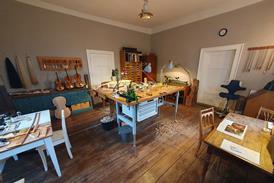7 different string players share their wisdom on maintaining motivation - as featured over the last 10 years in The Strad

1. Put yourself in the composer’s shoes
I always believed that stepping into the mind and place of composers could get us to practise empathising. And doing so with those who seem situationally, geographically and culturally far from you is something we must continually readdress and practice throughout our lives.
This type of practice not only has the potential to motivate and inspire you musically and emotionally, but to nurture your personality and humanity.
Nicola Benedetti, May 2019
2. Choose repertoire you love
Whenever I do this, then technical difficulties become less of an obstacle. Take Stravinsky’s Violin Concerto. There are parts that are extremely difficult, but the music of those passages is so brilliant that the technical issues don’t bother me in the same way that they would in a piece with no substance that’s all about passagework and circus monkey technique.
Leila Josefowicz, April 2019
3. Be patient
Since artistic goals can be lofty, intangible and subjective – which is what makes them so intoxicating – it’s easy to get caught up and frustrated. But there will always be some way you can make progress. It could be one note, a new tonal nuance, another line memorised or a new understanding of the piece’s architecture. Even if you make only one small improvement a day, that’s still 365 points of progress in a year.
Hilary Hahn, May 2017
4. Stay focused on what you want
It helps to have a goal - to say, ‘I will accomplish this today’. For me, motivation is easy, as I always have the spectre of failure at the next concert or recording staring at me.
James Ehnes, August 2014
5. Divide up your practice time
If I have a lot of repertoire to learn, I’ll practise for up to eight hours in a day. But I never practise for more than an hour at a time: I’ll do an hour then eat something, do another hour and watch some TV, do another hour and so on. For me an hour is the maximum I can focus properly.
Sarah Chang, March 2015
6. Plan your practice according to how you feel
If you’ve been travelling and carrying a lot of bags so feel weak or tired, you’ll have to build up slowly during your next practice session. If you’ve had a run of a routine of practice, you should be able to start at a slightly faster pace and work from there.
Rachel Podger, May 2014
7. Enjoy not practising
Of course it’s important for a child to have a wonderful teacher and to practise hard, but that child has to have a normal childhood, like I did – going to the cinema, having fun at parties, all those things. They have to be allowed to be a normal human being.
Julian Rachlin, April 2009



































1 Readers' comment